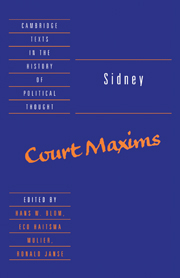Book contents
- Frontmatter
- Contents
- Preface
- Note on the text
- Introduction
- Principal events in Sidney's life
- Bibliographical note
- Biographical notes
- Court Maxims
- First Dialogue
- Second Dialogue
- Third Dialogue
- Fourth Dialogue
- Fifth Dialogue
- Sixth Dialogue
- Seventh Dialogue
- Eighth Dialogue
- Ninth Dialogue
- Tenth Dialogue
- Eleventh Dialogue
- Twelfth Dialogue
- Thirteenth Dialogue
- Fourteenth Dialogue
- Fifteenth Dialogue
- Index of biblical quotations
- Index of proper names
- Index of subjects
- Cambridge Texts in the History of Political Thought
Sixth Dialogue
Published online by Cambridge University Press: 05 June 2012
- Frontmatter
- Contents
- Preface
- Note on the text
- Introduction
- Principal events in Sidney's life
- Bibliographical note
- Biographical notes
- Court Maxims
- First Dialogue
- Second Dialogue
- Third Dialogue
- Fourth Dialogue
- Fifth Dialogue
- Sixth Dialogue
- Seventh Dialogue
- Eighth Dialogue
- Ninth Dialogue
- Tenth Dialogue
- Eleventh Dialogue
- Twelfth Dialogue
- Thirteenth Dialogue
- Fourteenth Dialogue
- Fifteenth Dialogue
- Index of biblical quotations
- Index of proper names
- Index of subjects
- Cambridge Texts in the History of Political Thought
Summary
Fifth Court Maxim: The happiness of people is as hurtful to kings as the greatness and virtue of the nobility
Philalethes: the nobility, while in reputation and power, have been ready to head the people for redress of grievances; and, being thus removed and abated in their credit, is a great service to the king. Yet, as long as the people continue strong, numerous, and rich, the king can never be happy.
Eunomius: I should rather have thought the riches and happiness of the people conducible to the security of the governors. If rich, they will be content and quiet for fear of confiscations. But if poor and that by means of the governors, they will soon grow to furious resolutions, having little to lose.
Philalethes: others have been of your opinion, but I think the contrary truer, for in all times seditions have begun in the richest and most populous cities. All the tumults in the Low Countries began in Antwerp, Ghent, Brussels, and other principal cities. The French league began in Paris. And those troubles which in this age distracted France were all hatched at Paris, Bordeaux, or Rouen. Those of Naples grew within its walls. And all ours grew from the greatness and strength of London. Generally all people grow proud when numerous and rich; they think themselves masters of all. The least injury puts them into a fury. But if poor, weak, miserable, and few they will be humble and obedient.
- Type
- Chapter
- Information
- Sidney: Court Maxims , pp. 71 - 80Publisher: Cambridge University PressPrint publication year: 1996

